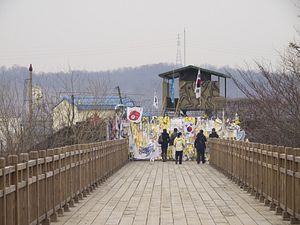The proposal for a World Peace Park in the Korean Demilitarized Zone (DMZ) has caught the public’s attention, particularly since South Korean President Park Geun-hye took office in 2013. The Blue House has yet to announce a detailed plan, but recently there has been fierce competition among three possible locations
This proposal is very refreshing and interesting, especially in light of the current regional situation. Although President Park’s idea sheds some light on the process of resolving the confrontation between South Korea and North Korea, the proposal still faces a number of obstacles on both sides of the 38th parallel. Meanwhile, in considering the peace park, South Koreans are also concerned about the reactions and attitudes of other parties, such as the UN, the U.S., and China. Other parties may have incentives to show strong interest in and support for the South Korean idea, or they may think the proposal is interesting but unrealistic.
China, as the host of Six-Party-Talks and a great power that has a very important role in regional politics both historically and geopolitically, basically welcomes South Korea’s idea. China encourages both the South and the North to work together on the peace park. China’s stance on this issue has obvious links to China’s attitudes and strategies towards North Korea and South Korea respectively. China wants to balance the North and the South. Given the current situation, China welcomes and encourages South Korea’s constructive initiatives toward total reconciliation between the two Koreas, but Beijing will not push the North too hard on South Korea’s behalf.
China’s recent diplomacy has focused on a global strategy, but the maintenance of peace and stability on the Korean Peninsula has always been regarded as one of China’s most important interests and concerns. Since North Korea has become significantly less cooperative, China has had to adopt a “wait and see” attitude toward North Korea, although this does not mean that China completely rejects and denies its special connections with the North Korean regime. Meanwhile, the relationship between China and South Korea has been the best among all of China’s relationships with its neighbors. Ideological and political differences have not prevented China and South Korea from constructing a certain level of mutual trust on a series of regional issues regarding peace, stability, and particularly denuclearization on the Korean Peninsula. Hence, it is particularly important for China and South Korea to increase their cooperation on specific regional issues, initiatives, and visions for achieving a future total reconciliation between the North and the South. In this regard, China would naturally and reasonably support South Korea’s proposal of a DMZ World Peace Park.
In fact, according to South Korean media, Chinese President Xi Jinping expressed his support for President Park Geun-hye’s suggestion of a DMZ World Peace Park during their meeting at the APEC summit in October 2013. President Xi noted that “the successful building of such a peace park will be beneficial to regional peace and stability.” But Xi further stated that the two Koreas should communicate with each other on this proposal, though China may also try to find ways it can help.
Xi’s October 2013 remarks were one of the most official and clear indications of Chinese support for the DMZ World Peace Park so far, however diplomatic-sounding they were. Later, during his state visit to Seoul in July 2014, President Xi again expressed his support for President Park’s “Dresden Declaration,” which incorporates the idea of a DMZ World Peace Park. So far, the message seems to be clear.
China supports any peaceful initiatives aiming toward peace and stability in the Korean Peninsula, particularly those suggested by one of the two Koreas rather than by external parties. With multiple approaches and frameworks for handling Korean Peninsula issues stalled or at dead-ends, such “small-scale unification projects” could serve as complementary paths forward, especially with regards to certain specific inter-Korean issues.
However, China may not intervene too deeply. The DMZ World Peace Park is a sensitive issue. At the grand strategic level, China strongly encourages the two Koreas to work together toward total reconciliation, and thus naturally would welcome inter-Korean proposals and acts aiming to realize peace and stability in the Korean Peninsula. However, given the current situation and its relationships with North Korea and South Korea respectively, China may find it more practical to keep a certain distance from this project. Beijing may suggest that South Korea find an appropriate path to work with North Korea to realize this idea, without China becoming too deeply involved.

































